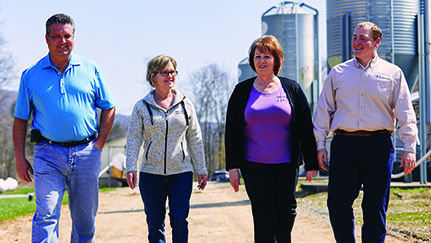Here are four ways to facilitate the right communication for a successful family farm transition
1. Meet and talk early and often
It starts with well-organized family meetings that bring together all farm stakeholders.
“Hold family meetings to discuss issues that are important to the family and the business. Each meeting should have an agenda that is distributed in advance so that each participant has a chance to prepare for the meeting," Hamilton said. "Everyone should come prepared. Be willing to listen while sharing information openly.”
2. Establish clear leadership
A strong leader is hugely important to a successful farm transition. Once you’ve committed to regular communication, appoint the right leader to guide all stakeholders through the process.
"A significant part of any succession plan is determining who takes leadership in the next generation. The family should consider whether the candidate has strong leadership skills,” Hamilton said. “Keep in mind that leadership requires boldness and decisiveness.”
3. Be fair, not equal
Not all heirs are interested in managing a farm. It’s often natural to want to treat all heirs equally in building a farm transition plan. But that’s not always fair to those who do want to manage the farm well into the future.
"This is one of the most difficult issues parents face in terms of whether to treat them fairly or equally. A fair arrangement may not necessarily be equal," Hamilton said. "In pursuit of fairness, it is not usually a good idea to give the off-farm children a passive interest in the farming operation. The active children will need freedom of operation to succeed."
4. What not to do to plan a successful farm transition
The right communication strategy for a successful farm transition also includes what not to do. Don’t let things like gossip and grudges disrupt progress toward a successful farm transition.
"Avoiding gossip helps with family trust that leads to mutual understandings about the appropriate behavior of family members in developing a succession plan," Hamilton said. "If family members become angry with one another over an issue, they should not carry grudges. They should get it out in the open, discuss it in a positive manner and move on. This will enable them to avoid turning a disagreement into a family fight. That can end their relationship and any hopes for an amicable succession plan.”
